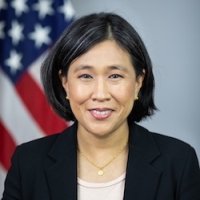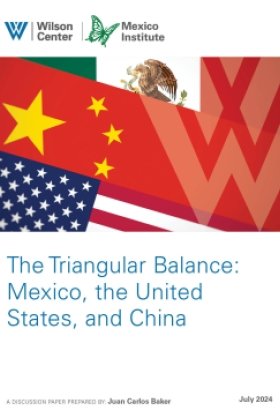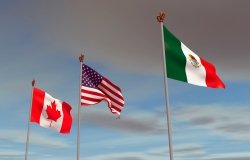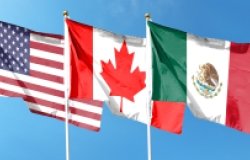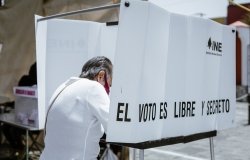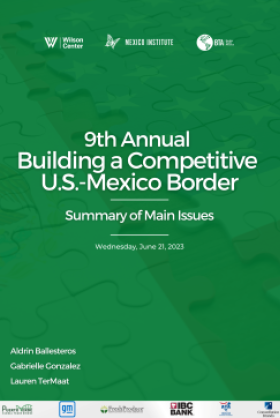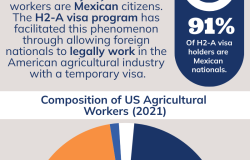Alamy
Webcast | USMCA at One
On June 30, 2021 the Wilson Center's Mexico and Canada Institutes joined a conversation with the trade ministers from the United States, Mexico, and Canada. This event focused on the biggest lessons learned from the first year of USMCA, as well as on the top priorities for North American collaboration in the years ahead.
Overview
July 1 will mark the first year anniversary of the US-Mexico-Canada Agreement (USMCA). The COVID-19 pandemic made the implementation of the USMCA more challenging than previously hoped. However, this past year also highlighted the critical need for collaboration among the United States, Mexico, and Canada to implement the USMCA; a key component of the North American partnership.
As we approached the first anniversary of the USMCA, the Wilson Center's Mexico and Canada Institutes hosted a conversation with the trade ministers from the United States, Mexico, and Canada. This event focused on the biggest lessons learned from the first year of USMCA, as well as on the top priorities for North American collaboration in the years ahead.
Selected Quotes
Amb. Mark Green
"If anything, the pandemic has reinforced the deeply interconnected nature of our economies and societies. It has shown us the risk of over reliance on supply chains, whose crucial links may run through far off lands. It is essential that we—government, private sector, and civil society—learn from the pandemic, that we implement plans and policies that will help mitigate the impact of future disruptions, and that we recognize the value and potential for nearshoring, crucial sectors and important supply chains."
Amb. Katherine Tai
"I take your point about the trade politics being difficult. They have been difficult, but look at USMCA as a high standard agreement. I think 89% of House members voted for this agreement and it was 89 senators, which out of 100, gives you 89% there as well. That's really, I think, a transformation of some of our trade politics, and is the reason why I think USMCA really is transformational. Just as NAFTA started a trajectory of trade agreements for a generation, I think that USMCA is the beginning of a trajectory for a new generation of trade agreements."
The USMCA now includes the strongest labor and environmental standards in any agreement ever, a new labor-specific enforcement mechanism, and critical changes to intellectual property provisions designed to increase access to affordable medicine for regular people.
"We should celebrate the USMCA because of what it represents: a renewed commitment by our three countries to pursue negotiations that raise standards and create that race to the top."
"The trust and the relationships that we build in renewing the terms of this agreement will help us to promote the competitiveness of North America and respond to the policies of non-market economies that undercut our businesses and our workers."
"The implementation process is ongoing. Working on this agreement is never going to be finished. And I think that’s a pretty critical notion that we’re really trying to focus on, which is [that] these agreements are about relationships and relationships are dynamic, just as our global economy is dynamic. And the way that we interact with each other, the mechanisms that we have for cooperation, for building together, but also for managing our frictions, is an ongoing process."
The Honourable Mary Ng
"By modernizing North American rules of trade and simplifying trade processes, our businesses are better able to meet the most pressing challenges of our time‑ from the pandemic to climate change. Our renewed commitment to the automobile industry in CUSMA is an excellent example of this. By working together under this new agreement, we're incentivizing North American production of zero-emission vehicles and turning our countries into global leaders in the clean energy vehicle market. This is about strengthening our long-term competitiveness, generating sustainable growth, and creating good jobs across our countries."
"This is about strengthening our long-term competitiveness, generating sustainable growth, and creating good jobs across our countries…By working hard in each of our countries to implement the new NAFTA, we’re sending a strong symbol to our people, our businesses, our communities, and our investors. It is a message about our renewed commitment to the trilateral economic partnership. One that protects workers, supports small businesses, creates opportunities for underrepresented groups, and contributes to a more sustainable and inclusive future."
"It is this evolving ability [of] this very good framework in the new NAFTA that provides the condition for us to keep building on making sure that this agreement really does in fact help us become the most competitive region in the world."
Sec. Tatiana Clouthier Carillo
"We have worked hand in hand with the private sector and workers, women and men, that will be ready to carry out the implementation and to receive the benefits of reform. Also, we have carried out reforms to improve minimum wages and to improve the scheme of profit distribution, and the free trade agreement has been very significant."
"We have a lot of work to do as nations, however, this treaty has been modernized up to par with the rest of the world. We are able to face the new challenges."
"The USMCA has been a powerful engine for economic recovery in North America. And despite the pandemic… USMCA helped our investments with Canada and the U.S."
"We have a big region where we can strengthen ourselves, [but] don’t be afraid, [because] fear paralyzes. We have less oxygen in our head if we have fear."
Rep. Kevin Brady
"We have to as partners continue to address massive unfair subsidies dumping, IP theft, forced technology transfers, unscientific barriers to ag products, protectionist restrictions on data transfer, and then localization measures of all sorts. These are all the challenges, globally. I'm convinced that UMCA shows us a better way, with market principles, high standards, innovation and fair competition, and strong labor standards. I think USMCA challenges the world, to embrace the future rather than a protectionist, isolationist past."
"Will we always agree? No. That’s why USMCA has an effective dispute settlement system to provide timely and fair resolutions. The state-to-state dispute settlement system under NAFTA was broken, by allowing any party to block the formation of dispute panels. This shouldn’t be optional. The USMCA fixed that. Now panels will be appointed. The process has been approved to require timely outcomes. And this upgrade, perhaps most importantly, applies to all aspects of the agreement."
"While there are challenges, I’m optimistic. Because of this agreement we can work through this in a way that affirms rigorous enforcement, but in a way that moves all three countries forward."
"USMCA helps us provide stronger, more resilient supply chains, more resources in North America, we can buy and produce more goods. Especially key crucial medical products, medicines, supplies, and ingredients to produce them. Our economy and I think our health depends on our medical independence from China in these key areas. I think we all benefit from increased regional production of medical and pharmaceutical products. Our crucial supply chains can be anchored in North America."
Earl Anthony Wayne
"As we are moving forward, it is really important to have a dialogue between governments and stakeholders. Certainly that will happen between individual governments and their own stakeholders in their own countries."
"When we start trying to find solutions to some of these broader problems, it really is only going to be done well if other agencies get involved—by all three governments."
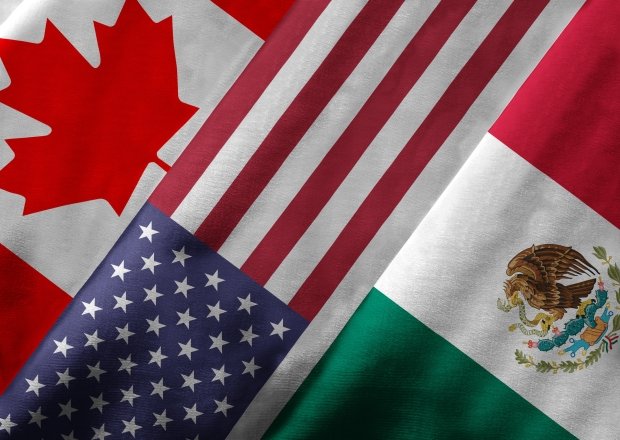
USMCA Resource Page
Welcome to the Wilson Center's USMCA Resource Page. The Mexico Institute and the Canada Institute will provide up-to-date coverage as USMCA implementation progresses. We invite you to check back frequently for updates to this resource.
ExploreKeynote Speakers
Panelists
Hosted By

Mexico Institute
The Mexico Institute seeks to improve understanding, communication, and cooperation between Mexico and the United States by promoting original research, encouraging public discussion, and proposing policy options for enhancing the bilateral relationship. A binational Advisory Board, chaired by Luis Téllez and Earl Anthony Wayne, oversees the work of the Mexico Institute. Read more

Canada Institute
The mission of the Wilson Center's Canada Institute is to raise the level of knowledge of Canada in the United States, particularly within the Washington, DC policy community. Research projects, initiatives, podcasts, and publications cover contemporary Canada, US-Canadian relations, North American political economy, and Canada's global role as it intersects with US national interests. Read more
Thank you for your interest in this event. Please send any feedback or questions to our Events staff.

